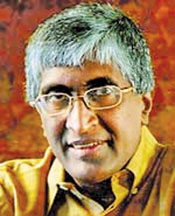Film-maker's interpretation should be visible in cinema- Prof. Sunil
Ariyaratne
By Anuradha KODAGODA
Kusa Paba, the latest film by Prof. Sunil Ariyaratne is based on Kusa
Jathakaya, one of the most popular Jathaka tales in 550 Jathaka. It is
the story of one of Prince Siddhartha's previous births, one in which he
was born with a disfigured face and had to woo the most beautiful
princess in the land.
The script is written by Dr Tissa Abeysekara which is believed to be
his last script before he passed away.
 Below
is an interview done by Sunday Observer with the film director Prof.
Sunil Ariyarathne about Kusa Paba. Below
is an interview done by Sunday Observer with the film director Prof.
Sunil Ariyarathne about Kusa Paba.
Question: Tell us about the background of Kusa Paba.
Answer: Kusa Paba is based on Kusa Jathakaya which is one of the most
famous stories from 550 Jathaka Tales book. In the 13th century King
Parakramabahu wrote Kausilumina which is regarded as the greatest Maha
Kavya in Sri Lankan history which is also based on Kusa Jathakaya.
Likewise, in various eras in Sri Lankan history of literature, Kusa
Jathakaya has been reproduced in various art forms.
The idea of making a film based on Kusa Jathakaya was in my mind
since the time I was lecturing in Jaffna University. At that time Prof.
Sucharitha Gamlath was the Head of the Department and he wanted me to do
Kausilumina for the students.
Therefore I could spend more time with that Maha Kavya. I was amazed
because every single line that King Prakramabahu has written was founded
on marvellous imagination. Therefore, it was a distant dream to do a
film based on Kusa Jathakaya. Thirty years before me and Prof.
Sucharitha Gamlath wrote a script based on Kusa Jathakaya however, we
weren't able to produce it into a cinema that time due to various
reasons.
However, the idea of making a film never faded and in 2005 I invited
Thissa Abesekara to write a script based on Kusa Jathakaya and he too
was pleased to do a script based on a Jathaka tale which he has never
tried.
That's how Kusa Paba became a reality after so many years of hope.
Q. During the recent past there has been a noticeable trend
towards creation of historical themes in Sri Lankan cinema. Is Kusa Paba
one of them?
A. I think this trend has been created in Sri Lankan cinema
with the success of Jackson Anthony's film Abha. However, Kusa Paba
script was written in 2008. Therefore it is understandable that this is
not based on that trend. With the success of Abha, I must admit that it
was easy to find producers for a historical theme film.
However, this is not an erroneous trend. If we consider the 2,500
years of our history, there are more than enough stories that are
extremely suitable for cinema productions which we have not yet tapped
properly. But in world cinema there is a good recognition for historical
theme films. Therefore, I must say this is a good trend which we have to
encourage for the well-being of Sri Lankan cinema.
When producing Kusa Paba, we have not targeted any international film
market and we have not even subtitled the film because it is considered
only for the Sri Lankan cinema audience. The intention of making this
film is to produce an entertaining, meaningful film based on a
historical theme for the Sri Lankan cinema audience without losing their
hopes towards cinema which I think we have succeeded when considering
the good feedback we are receiving from the audiences.
The total cost of Kusa Paba is Rs.850 lakhs and to earn Rs.1 of
profit we have to earn Rs.2000 lakhs. We are almost reaching that limit
and though people say there is no more cinema culture existing in Sri
Lanka., as per my observation there is always a good audience for good
cinema.
Q. Why did you settle for an Indian actress as the main
character in Kusa Paba? Does that show an incapability or less
confidence of Sri Lankan actresses?
 |
|
A scene from Kusa Paba |
A. It is a tragedy to realise the extent of damage that Sri
Lankan actresses make for themselves by acting on mega television
series. People may tend to get bored to see the same faces on all five
days on TV as well as on cinema. That is the main reason that I wanted
to get an actress from 'outside'. I wanted to differentiate with the
existing ones.
There are talented actresses who come from these mega series as well,
but it's quite difficult for them to adapt to the cinema. Other than
that, since Kusa Paba is based on Indian culture I wanted to get an
actress with Indian looks and behaviour.
Therefore, I wanted to select a talented actress, who has all these
qualities. The only one who came to mind was Pooja and today I think my
judgment is correct.
Q. Do you think Jackson Anthony is the best for the character
of Kusa, rather selecting a younger actor?
A. It was more complicated when selecting an actor for Kusa
than selecting an actress for Paba. Because, the talent, looks and the
knowledge of this historical character is imperative, when selecting an
actor for this role.
I couldn't be satisfied and confident with any of the good looking,
young actors that we have in Sri Lankan cinema.
Therefore, I had to fore-go the 'young look' of the character and
wanted to be more conscious about the talent and the ability of
understanding this historical character. I think Jackson has done a
great job which nobody else could do in Sri Lankan cinema.
Q. On Jathaka tale, the ending was with the judgment given to
Pabawathi which she goes back to Kusa by betraying herself otherwise she
has to sacrifice her life. This shows the male dominant approach of
Buddhism.
You have changed the ending in to Pabawathi who won't accept the male
dominant law by betraying herself and she was fearless to sacrifice her
life to establish her right to live with a man whom she truly loved.
Why did you want to have a different ending? Does it mean that you
don't agree with the original Jathaka tale ending?
A. If we recreate one art form into another, it's useless if
we produce the same thing over again. Because, as I believe there always
should be something creative and the creator's interpretation should be
visible on the reproduction. When considering Sarachchandra's Sinhabahu,
he's giving new interpretations for its characters and for me it is more
a modern approach.
In Kusa Jathakaya, most of the times the characters are not logically
developed and for me it gives a quite prejudiced viewpoint on women. I
wanted to change the perspective of Kusa Jathakaya in my production into
a more logical manner, and I completely ignored the prejudice and
disheartened perspective of women which carries in Kusa Jathakaya;
rather I wanted to look at Pabawathi from a more human angle without
giving any judgment to that character. I also wanted to highlight
Pabawathi's love in my film, which I see as a more human and natural way
of feminine love, though it's completely ignored in the Jathaka tale.
Q. In Kusa Paba we can see that the metaphors of the Jathaka
tale, for example, the golden statue of Pabawathi, has been used
directly on the film which damages the realistic view of the film. What
do you think?
A. We have edited so many metaphors which were there in the
Jathaka tale to maintain the realistic view of the film. We couldn't
find any other way of communicating the golden statue on the film and it
is not possible to ignore this because it is one major point which we
had to use to develop the story. I admit that it was not visualised in a
perfect manner.
Q. What do you understand as cinema?
A. In one way cinema is a form of art and in another way it is
an industry. In world cinema there are two categories of cinema, namely
entertainment cinema or mainstream cinema and experimental or
alternative cinema which is common in Sri Lanka as well. However, 90
percent of films which were produced in Sri Lanka are for mainstream
cinema which target mass audience.
So far, I have done quite a few films by maintaining the artistic
form of cinema which can be enjoyed by mass audiences. I believe we have
to encourage the mainstream good quality films to have a sustainable
cinema industry.
When we step into the cinema industry, compared to the current
situation it was quite easy to find an investor for a film because those
days it was a privilege to produce a film and it was also affordable.
Today the industry is quite challenging and unlike in our generation,
there are so many battles to win to sustain or even get into the cinema
industry.
Q. What do you think about upcoming trends in cinema, such as
short films/low budget films/digital films in the country?
A. Certainly, there are talented youth who are passionate
about cinema which I see as a positive sign. However, the drawback I see
in this talented young generation is, though they are quite familiar
with new technology, ideologically they are very weak. Recently I was
able to see a few short film festivals and what I observed in most of
the films, the camera angles, editing, use of the technology and music
were perfectly fine, but it is really hard to find a strong conceptual
approach in many films.
The main reason I believe is the lack of the interest in literature,
and even in universities today it is hard to find students who are
reading and studying literature in depth.
I strongly believe that nobody can do good cinema without a proper
knowledge of literature and it is not possible to become a cinema
artiste by studying or exploring only cinema. With the massive budget
requirement for cinema production which is hardly affordable in our
country, digital cinema is a good solution.
I think our cinema has not reached that level yet. I'm not happy with
the current digital cinema which already exists in the country, because
they are only low budget films, with very poor picture quality. To
encourage this type of trend would be harmful for the cinema industry in
the country.
Q. What do you think about world cinema?
A. Though we are a small country, quite a few times we could
sound our cinema in world cinema platforms which I see as an
achievement.
Among the many cinema artistes, Prasanna Vithanage's matured cinema
approach I appreciate a lot and he could take Sri Lankan cinema to the
world after Lester James Peries.
As I know he has a special bent for literature and that is visible in
his creations. Likewise, we have a few other cinema artistes who could
touch the world cinema. I think we are in a position to appreciate in
world cinema which we have to develop further in the future by producing
good, meaningful cinema to maintain the Sri Lankan identity.
|

